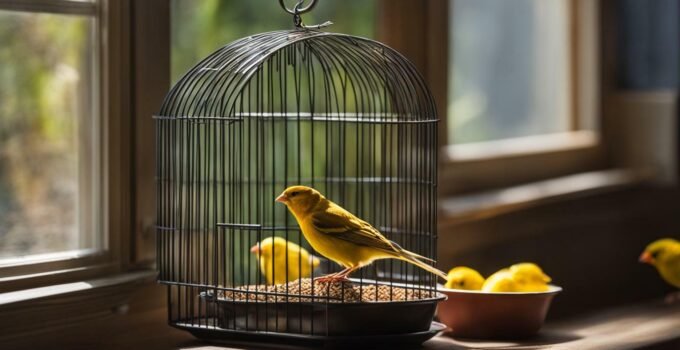Canaries are bright and alert pets that require certain care to keep them happy and healthy. When caring for a canary at home, it is essential to provide them with a suitable cage that allows for adequate space and flight. The cage should be positioned in a quiet area of the home, away from direct sunlight and drafts. Canaries primarily feed on seeds, so it is important to provide them with a high-quality canary mix and supplement their diet with occasional fruits and vegetables. Other dietary requirements include providing grit, a cuttlefish bone, and a mineral block. Canaries are prone to stress and should not be handled frequently. Instead, handling should be limited to necessary health check-ups. Canaries may be kept with other friendly birds in aviary surroundings, but care should be taken to ensure they do not bully smaller or less confident species.
Key Takeaways:
- Canaries require a suitable cage with adequate space and flight.
- The cage should be placed in a quiet area away from direct sunlight and drafts.
- A high-quality canary mix supplemented with fruits and vegetables is important for their diet.
- Grit, a cuttlefish bone, and a mineral block are essential dietary components for canaries.
- Handling should be limited to necessary health check-ups due to canaries’ propensity for stress.
Choosing the Right Cage for Your Canary
When it comes to canary pet care, providing the right cage is crucial for their well-being. A suitable cage allows your canary to have enough space for flight and exercise, ensuring a healthy and happy life. Consider the following factors when choosing a cage for your feathered friend:
Size Matters
One of the most important aspects to consider is the size of the cage. Canaries are active birds and require ample space to stretch their wings. The cage should be large enough to accommodate their natural flight patterns. A good rule of thumb is to select a cage that is at least 20 inches in length, 16 inches in width, and 20 inches in height. This provides enough room for your canary to move around comfortably.
Bar Spacing
The spacing between the bars is another crucial factor to consider. Canaries are small birds, and the bars should be spaced appropriately to prevent any risk of escape or injury. Opt for a cage with bars spaced no more than 1/2 inch apart. This ensures that your canary cannot squeeze through the gaps or get its head stuck between the bars.
Accessories and Perches
Equipping the cage with appropriate accessories and perches is also essential for your canary’s well-being. Provide perches of varying thickness to help exercise your canary’s feet and prevent discomfort. Additionally, include a water dispenser, feeder, and toys for mental stimulation and entertainment. These additions will ensure a comfortable and enriching environment for your canary.
By choosing the right cage for your canary, you are providing them with a safe and comfortable home. Remember, a happy canary is a healthy canary.
| Factors to Consider | Recommendation |
|---|---|
| Size | At least 20 inches in length, 16 inches in width, and 20 inches in height |
| Bar Spacing | No more than 1/2 inch apart |
| Accessories and Perches | Varying thickness perches, water dispenser, feeder, and toys |
Ideal Placement and Environmental Conditions for Canaries
Proper placement and environmental conditions are crucial for the well-being of canaries. By ensuring the right location and surroundings, you can create a stress-free and conducive environment for these beautiful birds to thrive in.
The Right Location
When choosing a spot for your canary’s cage, it’s important to consider their need for a quiet and peaceful area. Place the cage away from high-traffic areas and noisy appliances to prevent unnecessary stress. Canaries are sensitive to loud noises and disturbances, so a calm environment will allow them to feel secure.
Away from Direct Sunlight and Drafts
Avoid placing the cage in direct sunlight, as it can lead to overheating and discomfort for your canary. Similarly, drafts can cause respiratory issues, so ensure that the cage is not exposed to cold or windy areas. Find a location with stable temperature and humidity to maintain the ideal living conditions for your feathered friend.
Socialization and Flight
Canaries are social birds and benefit from interaction with their owners. However, it’s important to strike a balance between socialization and allowing them ample time for flight. Set up a schedule that includes daily supervised time outside the cage for exercise and exploration. Provide perches and toys to encourage natural behaviors and keep them mentally stimulated.
Creating the right environment for your canary is essential in promoting their overall well-being. By understanding their basic care requirements, you can ensure that they live a happy and healthy life in your home.
| Placement Tips | Environmental Conditions |
|---|---|
| Choose a quiet area away from noise and distractions | Avoid direct sunlight and drafts |
| Provide a calm and peaceful environment | Maintain stable temperature and humidity |
| Allow for socialization and supervised flight time | Provide perches and toys for mental stimulation |
Feeding Your Canary a Nutritious Diet
Proper nutrition is essential for the health and well-being of your canary. A balanced diet will ensure that your feathered friend receives all the necessary nutrients to thrive. The key to feeding your canary is to provide a variety of foods that meet their specific dietary requirements.
Canaries require a high-quality canary seed mix as their main source of nutrition. Look for a mix that includes a variety of seeds such as canary grass, flaxseed, and hemp seed. It’s important to choose a mix that is fresh and free from any pests or mold. Additionally, canaries should be offered fresh fruits and vegetables as an occasional treat. These can include chopped apples, carrots, and leafy greens like spinach or kale.
In addition to seeds and fresh produce, it’s important to provide your canary with supplemental sources of essential minerals. This can be achieved through the use of a grit dispenser, which helps aid in digestion, or by offering a cuttlefish bone or mineral block. These provide important minerals such as calcium, which are necessary for bone health and egg production in female canaries.
Sample Table: Canary Diet Options
| Food | Benefits |
|---|---|
| Canary Seed Mix | A source of essential nutrients and energy |
| Fresh Fruits and Vegetables | Provides vitamins and minerals as occasional treats |
| Grit | Aids in digestion and provides essential minerals |
| Cuttlefish Bone | Offers calcium for bone health and egg production |
| Mineral Block | Provides additional minerals for overall health |
It’s important to remember that canaries have small stomachs and can easily overeat. Monitor their food intake and adjust the amount accordingly to prevent obesity and related health issues. In addition, always provide fresh water for your canary, changing it daily to ensure it remains clean and free from contaminants.
By providing a nutritious and varied diet, you can ensure that your canary remains healthy and happy. Consult with a veterinarian or avian specialist for specific dietary recommendations based on your canary’s age, health, and individual needs.
Limitations on Handling and Social Interaction
When it comes to caring for canaries, it’s important to understand and respect their temperament and needs. Canaries are known for being sensitive birds, and excessive handling and social interaction can cause them stress and anxiety. Therefore, it’s crucial to limit the amount of time you spend handling your canary and provide them with a calm and quiet environment.
While occasional handling is necessary for health check-ups and other essential tasks, most canaries prefer to be left undisturbed in their cages. This allows them to feel secure and reduces the risk of injuries or accidents. Remember, canaries are delicate creatures, and rough handling can harm them.
If you notice any signs of distress or discomfort in your canary, such as excessive vocalization, flapping wings, or feather plucking, it’s important to consult a veterinarian. They can provide guidance on proper handling techniques and assess your canary’s overall health. Regular check-ups with a veterinarian are essential to ensure your canary’s well-being and early detection of any potential health issues.
Table: Recommended Handling and Social Interaction Guidelines for Canaries
| Activity | Frequency | Duration |
|---|---|---|
| Handling for health check-ups | As needed (recommended every 6-12 months) | Short and gentle |
| Handling for socialization | Occasional, if desired | Short and gentle, respecting the bird’s preference |
| Limiting out-of-cage time | As needed for flight exercise | Supervised and within safe, controlled areas |
By following these guidelines and being mindful of your canary’s temperament, you can ensure a harmonious and stress-free environment for your feathered friend.
Aviary Surroundings and Canaries
When it comes to providing the best environment for your canaries, considering aviary surroundings can be a great option. Canaries are social birds that thrive on interaction and the company of their own kind. In an aviary setting, they have the opportunity to fly, socialize, and engage in natural behaviors, which can greatly enhance their overall well-being.
However, it is important to be mindful of the dynamics between canaries and other bird species in an aviary. While canaries generally get along well with friendly birds, there may be instances of bullying behavior towards smaller or less confident species. It is crucial to closely monitor the interactions and ensure that all birds are safe and comfortable in their surroundings.
Flight time is essential for canaries, and an aviary setting provides ample space for them to spread their wings and engage in natural flight behaviors. The freedom to fly not only promotes physical exercise but also stimulates their mental and emotional well-being. Additionally, the presence of other birds in the aviary can offer opportunities for socialization and communication, which are important aspects of a canary’s natural behavior.
Overall, when considering aviary surroundings for your canaries, it is important to create a harmonious environment that promotes flight time, socialization, and the overall well-being of your birds. With the right precautions in place, an aviary can provide a wonderful living space for your canaries, allowing them to thrive in a natural and enriching environment.
| Advantages of Aviary Surroundings for Canaries | Considerations for Aviary Set-Up |
|---|---|
|
|
Providing Enrichment and Toys for Mental Stimulation
Keeping your canary mentally stimulated is essential for its overall well-being. Providing enrichment activities and toys can help prevent boredom and enhance its quality of life. Here are some ideas to keep your canary engaged and entertained:
- Perches and Swings: Install a variety of perches and swings in the cage to offer different textures and sizes. This will help keep your canary active and provide opportunities for exercise.
- Interactive Toys: Invest in toys designed specifically for canaries, such as puzzle feeders or foraging toys. These toys can challenge your bird’s problem-solving skills and provide mental stimulation.
- Mirror or Reflection Toys: Canaries enjoy looking at their reflection, so providing a mirror or toys with reflective surfaces can be a source of entertainment. However, be cautious not to overuse mirrors as they might become obsessed or territorial.
- Natural Elements: Introduce elements from nature into the cage, such as branches, leaves, or pine cones. These natural items can offer different textures for your canary to explore and interact with.
- Variety of sounds: Canaries are known for their beautiful singing abilities. Play calming music or nature sounds to provide auditory enrichment and create a soothing environment.
Remember, it’s important to regularly rotate and introduce new toys to keep your canary engaged. Observe your pet’s preferences and remove any toys that appear to cause stress or agitation. By providing enrichment and toys, you can ensure your canary remains mentally stimulated and leads a happy, fulfilling life.
| Toy | Benefits |
|---|---|
| Puzzle Feeders | Challenges problem-solving abilities and provides mental stimulation |
| Foraging Toys | Encourages natural foraging behavior and keeps the canary active |
| Mirror or Reflection Toys | Offers visual stimulation and entertainment, but use with caution to prevent obsession |
| Natural Elements | Provides different textures for exploration and interaction |
| Variety of Sounds | Offers auditory stimulation and creates a soothing environment |
Regular Veterinary Check-ups and Health Care
To ensure the well-being and longevity of your canary, regular veterinary check-ups are crucial. Just like any other pet, canaries require routine healthcare to prevent and detect any potential health issues early on. A qualified veterinarian with experience in avian medicine should be consulted for comprehensive check-ups and guidance on specific health care measures.
During these check-ups, the veterinarian will perform a thorough examination of your canary, including assessing their physical condition, checking for parasites, and evaluating their overall health. The veterinarian may also recommend additional tests if necessary. Regular check-ups are essential for monitoring the canary’s health and detecting any signs of illness or disease promptly.
In addition to regular check-ups, there are several health care measures you can take to ensure your canary remains in optimal health. These include providing a clean and suitable environment, maintaining proper hygiene in the cage, and offering a nutritious diet. It is essential to follow the guidelines provided by your veterinarian and make any necessary adjustments based on their recommendations.
Remember, early detection and prevention are key when it comes to the health of your canary. By prioritizing regular veterinary check-ups and implementing proper health care practices, you can provide the best possible care for your feathered friend.
| Veterinary Check-ups and Health Care Checklist |
|---|
| Regularly schedule check-ups with a qualified avian veterinarian. |
| Follow the veterinarian’s recommendations for vaccinations and preventive treatments. |
| Keep the canary’s environment clean and provide proper hygiene in the cage. |
| Ensure your canary receives a balanced and nutritious diet. |
| Observe your canary’s behavior and appearance daily for any signs of illness or distress. |
| Seek immediate veterinary attention if you notice any abnormal behavior or symptoms. |
Flight Time and the Importance of Perches
Allowing your canary to have regular flight time is essential for their physical and mental well-being. Canaries are active birds that enjoy stretching their wings and exploring their surroundings. By providing them with a safe and secure space to fly, you are giving them the opportunity to exercise their muscles and maintain their natural instincts.
In order to facilitate flight time for your canary, it is important to have the right perches in their cage. Perches serve as a resting place for your bird and also provide a platform for them to take off and land during their flight exercises. Choose perches of varying sizes and textures to keep their feet healthy and provide them with a stimulating environment.
Why Perches are Important for Canaries
Perches are not just a place for canaries to rest, but they also play a crucial role in maintaining their overall health. Here are a few reasons why perches are important for canaries:
- Exercise: Canaries use perches to hop, jump, and fly within their cage. This helps them to stay active and burn off excess energy.
- Foot Health: Different perch sizes and textures help to exercise the muscles in their feet, preventing stiffness and promoting proper blood circulation.
- Mental Stimulation: Perches provide canaries with a sense of security and a place to observe their surroundings. This helps to keep them mentally stimulated and engaged.
- Nail and Beak Maintenance: Regular perching helps to naturally wear down their nails and beak, reducing the need for frequent trimming.
Remember to position the perches at different heights within the cage to offer variety and mimic a natural environment. Additionally, ensure that the perches are clean and free from any accumulated droppings or debris, as this can lead to health issues for your canary.
| Perch Types | Benefits |
|---|---|
| Wooden Perches | Provide natural texture for foot exercise. |
| Rope Perches | Offer a softer surface and can help with foot health. |
| Branch Perches | Provide a more natural feel and encourage natural behavior. |
In conclusion, flight time and the availability of suitable perches are crucial for the overall well-being of your canary. By providing them with the opportunity to fly and the right perches to rest and exercise, you are ensuring a happy and healthy life for your feathered friend.
Conclusion
In conclusion, caring for canaries as pets requires attention to their specific needs and creating the right environment for their well-being. By following this canary care guide, you can ensure that your feathered friend thrives in your home.
Remember the basics of canary care: provide a spacious cage with appropriate perches, place it in a quiet area away from direct sunlight and drafts, and offer a nutritious diet consisting of a high-quality canary mix, fruits, vegetables, grit, cuttlefish bone, and a mineral block.
While canaries can be social birds, it’s important to limit handling and provide them with sufficient flight time to prevent stress. Consider providing enrichment activities and toys to keep them mentally stimulated and prevent boredom. Regular veterinary check-ups are also essential for maintaining their health and well-being.
By implementing these canary care basics, you can create a happy and healthy environment for your canary companion. Remember to always prioritize their needs and provide the love and attention they deserve.
FAQ
What are the basic care requirements for canaries as pets?
Canaries require a suitable cage with enough space for flight, a quiet environment away from direct sunlight and drafts, a high-quality canary mix, occasional fruits and vegetables, grit, a cuttlefish bone, and a mineral block.
How should I choose the right cage for my canary?
When choosing a cage for your canary, ensure it provides enough space for flight. The cage should be large enough to accommodate their wingspan and provide room for movement. It’s important to prioritize safety and choose a cage with appropriate bar spacing to prevent escape or injury.
Where should I position the cage and what environmental conditions are ideal for canaries?
Position the cage in a quiet area of your home, away from direct sunlight and drafts. Canaries thrive in a stable and peaceful environment. Providing them with a consistent temperature, appropriate humidity levels, and natural daylight patterns will contribute to their overall well-being.
What should I feed my canary and what dietary requirements do they have?
Canaries primarily feed on seeds, so it is important to provide them with a high-quality canary mix. Supplement their diet with occasional fruits and vegetables for added nutritional variety. Additionally, make sure to provide them with grit for digestion, a cuttlefish bone for calcium, and a mineral block for essential minerals.
How often should I handle my canary and engage in social interaction with them?
Canaries are prone to stress and should not be handled frequently. Instead, handling should be limited to necessary health check-ups or when absolutely necessary. Respect their need for personal space and create a calm and peaceful environment for them to thrive in.
Can I keep my canary with other birds in an aviary setting?
Canaries may be kept with other friendly birds in aviary surroundings. However, it is crucial to ensure that they do not bully smaller or less confident species. Carefully monitor their interactions and provide adequate space and resources for each bird to ensure their well-being.
How can I provide mental stimulation and enrichment for my canary?
Enrichment and toys play an essential role in keeping canaries mentally stimulated. Offer a variety of perches, toys, and activities to keep them engaged and entertained. Rotate toys regularly to avoid boredom and provide opportunities for natural behaviors such as foraging and flying.
How often should I take my canary for veterinary check-ups and what other health care should I provide?
Regular veterinary check-ups are important to ensure your canary’s overall health and well-being. Your veterinarian can advise on vaccinations, parasite control, and any specific health concerns. Additionally, maintain a clean and hygienic cage, provide fresh food and water daily, and observe your canary for any signs of illness or distress.
How important is flight time for canaries and what role do perches play?
Flight time is crucial for canaries to maintain their physical and mental health. Provide them with regular opportunities to fly and stretch their wings in a safe and controlled environment. Additionally, offer a variety of perches in their cage to promote natural foot and leg health.



